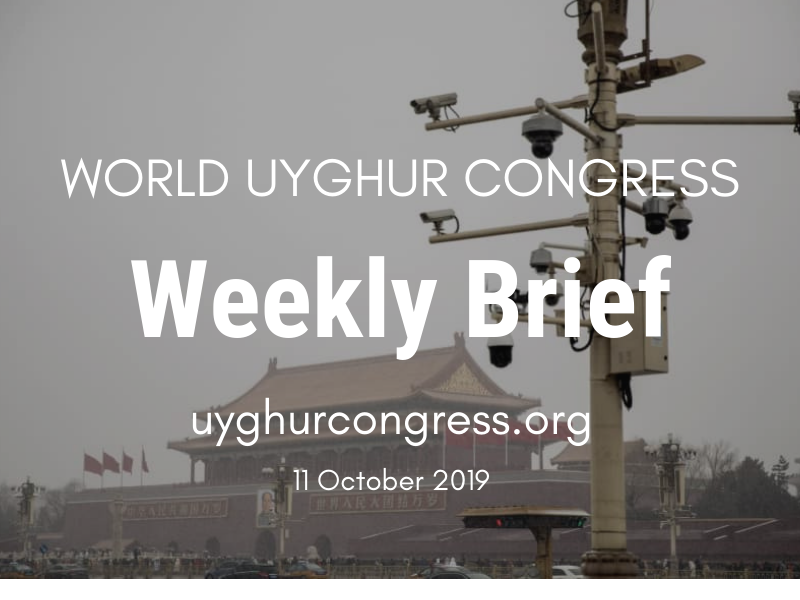Weekly Brief: October 11

World Uyghur Congress, 11 October 2019

U.S. Government Adds 28 Chinese Entities to Blacklist, Imposes Visa Restrictions
On October 7, 2019, the U.S. Commerce Department announced its decision to place 28 Chinese companies and government agencies on its ‘Entity List’ for complicity in human rights violations against Uyghurs in East Turkistan. The Entity List functions as a trade blacklist and bars companies or other entities from buying parts and components from U.S. companies without US government approval.
Those added to the list include Hikvision and Dahua, who designed and implemented the security and surveillance systems installed in the internment camps and throughout the rest of the region. The blacklisted entities also includes local and regional security bureaus who have implemented the CCP’s repressive policies.
Their addition to the Entity List will prevent U.S. companies from providing them with any resources or technology, which they had used in the past to carry our repressive policies against Uyghurs. These sanctions are a significant step to ensuring justice and accountability in response to the crisis.
The next day, on October 8, 2019, a second measure was announced by the U.S. State Department which imposed visa restrictions on Chinese government officials responsible for the internment camp system and for perpetrating related human rights violations against Uyghurs. The decision was announced in a press release, which also called on the Chinese government to immediately release all those in arbitrary detention.
National Basketball Association Faces Harsh Criticism For Pandering to China
Illustrating the sensitivity of the Chinese government about issues like Hong Kong as well as the fecklessness of organizations and companies in response to pressure from China, the NBA this week apologized for a tweet in support of Hong Kong protesters.
The apology was followed up by another statement from the NBA, but much of the damage was already done. The statements came in response to an initial tweet from Houston Rockets GM, Daryl Morey, in support of Hong Kong protesters. US fans and politicians subsequently called out the league for pandering to China and fans showed up at games this week with t-shirts and signs in support of Hong Kong and even some in support of Uyghurs.
It is worth noting that the NBA has forged a deep relationship with China over the last decade, with basketball being one of the most watched sports across the country. In addition, the NBA set up a training camp in Urumqi in 2016, which it continues to operate, despite the mass detention of Uyghurs in the region. Many have called China’s policies in the region Crimes Against Humanity and cultural genocide, though the NBA has not indicated that it will close the facility there.
Much more pressure in recent years has been exerted on foreign companies operating in China. The three largest U.S. carriers — American Airlines, Delta and United — were among those that removed references to Taiwan on their websites after complaints from the Chinese government. Tensions between China and foreign companies who ostensibly support civil and political rights continue to play out and their responses will watched carefully by the international community.
China Continues To Destroy Graveyards and Religious Sites in East Turkistan
A report from Agence France-Presse has shown the continued destruction of Uyghur graveyards in East Turkistan as part of a much broader campaign aimed at eradicating Uyghur cultural identity. AFP found that according to satellite imagery, the Chinese government has, since 2014, exhumed and destroyed at least 45 Uyghur cemeteries, including 30 in the past two years.
The destruction of graveyards stands as part of a much larger campaign in East Turkistan targeting a number of key aspects of the Uyghur identity including religious practice and expression, cultural activities and the physical manifestations of this culture like neighbourhoods, buildings and markets.
In addition to the razing of graveyards, the Chinese government has targeted Uyghur mosques in the last three years in particular. Large-scale mosques destructions began in late 2016 under the scope of a “Mosque Rectification” program, where Chinese authorities have conducted a systematic campaign to demolish or desecrate places of worship. Radio Free Asia indicated that during the official campaign in the fall of 2016, around 5000 mosques were destroyed.

